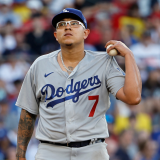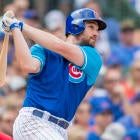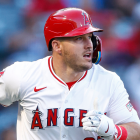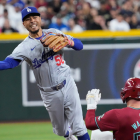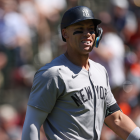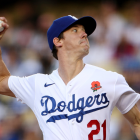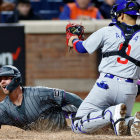On Monday night, the Cubs ran their NL-best record to 77-53 with their sixth-straight victory. They have a 4 1/2 game lead in the NL Central and four-game lead over the Braves for the top mark in the league. There was actually a scare in the ninth inning, though. The Mets had the bases loaded with one out, down by three and the wind was howling out.
No worries, though, Jesse Chavez came to the rescue.
OK, so that last pitch was down and robot umpires, yada yada yada. Beside the point here!
For as much as the big-ticket moves of the offseason for Theo Epstein, Jed Hoyer and company have not (yet?) panned out -- we're talking Yu Darvish, Tyler Chatwood et al -- the in-season trades have come back unbelievably great thus far. As Jim Bowden pointed out on CBS Sports HQ, the Cubs won the deadline as of Aug. 28.
We were on Chavez, so let's stay there. He's now worked 21 innings in 16 appearances. He's pitched to a 1.29 ERA, 0.76 WHIP and 26 strikeouts against two walks. The Cubs quietly picked him up on July 19 for a pitcher in Class A. With swingman Mike Montgomery in the rotation and then injured, in addition to closer Brandon Morrow being on the shelf, Chavez has proven an invaluable piece in long and short relief for manager Joe Maddon.
Getting a big piece without giving up much was a theme this trade season for the Cubs, in contrast with giving up a king's ransom for Jose Quintana last year.
Left-hander Cole Hamels toes the slab Tuesday night for the Cubs. The rotation was a big concern before the trade deadline. The Cubs didn't have a talented or deep farm system from which to deal. They would send swingman Eddie Butler, a player to be named later and a 17-year-old project to the Rangers for Hamels, who was struggling at the time. No more.
In five starts for the Cubs, Hamels is 4-0 with a 0.79 ERA, 0.94 WHIP and 30 strikeouts against eight walks in 34 innings. Last time out, he threw a complete game, which was especially valuable in saving the Cubs' bullpen given that the team wasn't looking at a day off until Sept. 13.
And then, there is Daniel Murphy. The Cubs were in an offensive funk a week ago. They went through five straight games with one run each and, what's worse, it was a solo home run each game. They just could not piece hits together. This coincided with the Nationals realizing they weren't going to contend and putting a few big-name players on waivers (Bryce Harper was pulled back). Murphy, somehow, got to the Cubs.
I can't, for the life of me, figure out how every other NL team passed on Murphy and let him fall to the Cubs. Notably with the Brewers and Cardinals front offices, how is there no passing thought of "we better claim Murphy or else he'll go to the Cubs?" You might say neither team could have used him or they actively didn't want him for off-field reasons and that's fine. You place the claim, don't work out a deal with the Nationals and he stays put. Maybe there was a passing thought, but no NL contender can justify letting this happen. They simply served up an outstanding hitter to the best team in the league.
It did happen, though, and the Cubs are now 6-0 with Murphy. He's been the absolutely perfect leadoff man for a team that was struggling to find one. The Cubs have scored 8, 7, 3, 10, 9 and 7 runs with him in the lineup -- again, that's after five consecutive games with one run each. Murphy is hitting .407/.448/.704 with his new team.
The Cubs got Murphy thanks to him getting through the other 14 teams in the NL on waivers and by giving up a 21-year-old middle infielder hitting .261/.358/.331 in High-A. That's it.
Add it all up, and the Cubs got three of their now most important players for essentially nothing of value to the long-term health of the franchise. We can't yet say this was anything like the Jake Arrieta/Pedro Strop trade or the Anthony Rizzo trade, but it appears this trade season was yet another master stroke from the Epstein Administration after a winter that so far looks pretty rough.











